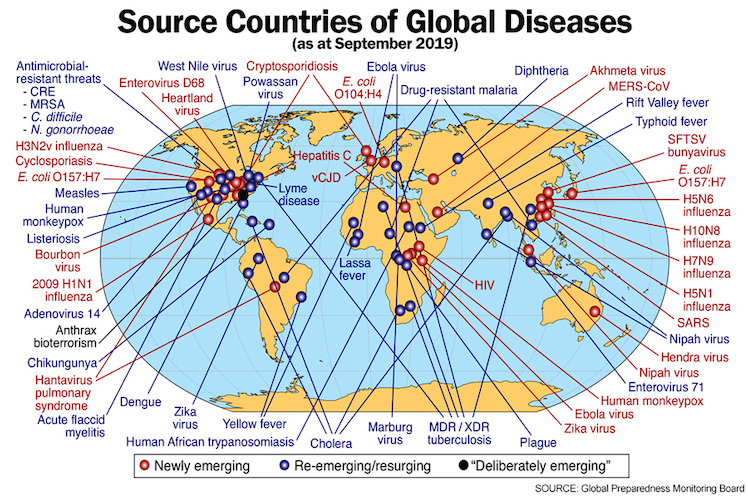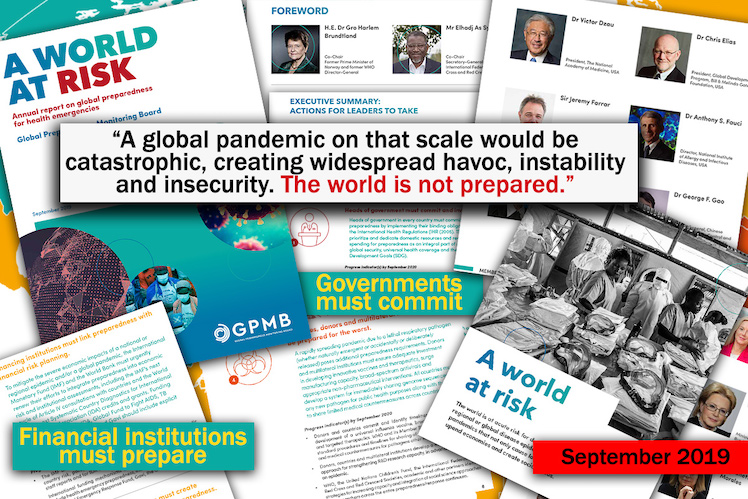The world is entitled to know the origins of COVID-19 and exactly how the outbreak began and how it was handled by every major nation, including China, given the pandemic alarm was raised back in September 2019. The World At Risk report by WHO and the World Bank Group contained dire warnings of a possible pandemic. These were largely ignored by most G20 countries including Australia. Is it any wonder most countries were dangerously ill-prepared, resulting in needless deaths? Marcus Reubenstein reports.
Thanks to a virus, transported in droplets just 0.005 millimetres in diameter, life as we know it has changed enormously.
The mortality rate of COVID-19 should see that is does not even come close to the deadliest pandemic in global history. However, as the world is so much more interconnected than at any previous time in history, the global disruption and economic fallout is without precedent.
With the world having sustained so much damage, the inevitable question is: Who is to blame?
To some people the answer is self-evident: China. Maybe those calling for a “China only” investigation should be looking closer to home?
A virus sprung onto the world?
With the exception of the precise name and nature of this latest coronavirus, not one single aspect of this current crisis had not been predicted by legions of scientists and epidemiologists who’ve warned for decades about an impending pandemic.
A comprehensive report handed to the Australian Government late last year showed that between 2011 and 2018, there were 1,483 epidemic events in 172 countries. It also contained dire warnings about the possibility of an impending pandemic.
The key to this, and numerous other warnings, was that the origins of any potential virus were not issue. The report was given to health officials in Australia and 189 other nations, the main issue was what, if anything, were countries doing to prepare?

GPMB research shows more viruses in North America than China
Meanwhile, Trump silences top US pandemic expert
This most recent warning was delivered just three months before the outbreak of COVID-19 in Wuhan. It came from the Global Preparedness Monitoring Board (GPMB) an international panel of health experts, which had had three times as many US representatives than any other single nation.
One of those scientists was Dr. Anthony Fauci, the lead adviser in the Trump Administration’s White House Coronavirus Taskforce. Last month, Donald Trump threatened to fire Fauci because he admitted the US’s slow coronavirus response had probably cost lives.
While the United States and Australia accuse China of cover-ups, overnight the White House intervened to stop Dr. Fauci from appearing before a Congressional hearing into the US coronavirus response.
The White House task force was first chaired by HHS Secretary Alex Azar who was pushed aside two months into the crisis. Azar is the Trump Administration Cabinet Secretary who appointed Brian Harrison – a former dog breeder with no clinical experience – to manage the day-to-day operations of the US Health Department’s coronavirus task force.
As yet, nobody in the west is calling on an inquiry as to how a labradoodle breeder was the first person appointed to coordinate the coronavirus response in the United States?
“It is well past time to act”
The words “it is well past time to act” were delivered in September 2019 by Norway’s former prime minister, Dr. Gro Harlem Brundtland, and Secretary-General of the International Red Cross, Elhadj As Sy.
They co-chair the GPMB which issued the report card on the world’s ability to cope with a major pandemic. Its assessment was unequivocal, stating:
“There is a very real threat of a rapidly moving, highly lethal pandemic of a respiratory pathogen… A global pandemic on that scale would be catastrophic, creating widespread havoc, instability and insecurity. The world is not prepared.”
The report found that of 190 nations, committed to fully cost and implement National Action Plans for Health and Security, only 51 had complied.
Was the media paying attention?
When the WHO and World Bank joint-funded report, entitled in bold caps A WORLD AT RISK was released on September 18 last year, the story was picked up by such austere publications as KY3.com, the Mexico Ledger, Kaiser Family Foundation News, Guardian Nigeria and Gizmodo.

The 2019 report handed to the Australian government
A Google News search reveals, only one major international English language publication carried the story, Hong Kong’s South China Morning Post. Little wonder Hong Kong has been among the best prepared in dealing with COVID-19.
The China investigation
Australia’s prime minister, Scott Morrison, and his foreign minister, Senator Marise Payne, have led calls for an investigation into the outbreak with suggestions investigators should have powers akin to those of weapons inspectors.
Herein lies the problem — they are only suggestions.
Save for a series of Tweets by the prime minister on April 22nd, the Australian Government has put nothing in writing relating to any investigation.
The relentless media narrative is that China must be subjected to a meaningful independent inquiry, yet the Government itself has done nothing meaningful by way of explaining what the inquiry should look like.
On that point, there is a Senate investigation, with narrow terms of reference, into Australia’s handling of COVID-19.
Committee member, Senator Rex Patrick, requested access to government briefing papers from January relating to COVID-19. The Prime Minister’s department denied the Senate access to all of these papers.
“As the Prime Minister is calling on China to be more transparent and accept an international inquiry into the COVID-19 outbreak, his own bureaucrats are pulling down the shutters on scrutiny of his own administration.”
Australian Senator Rex Patrick
“There’s a touch of international hypocrisy about that,” says Patrick.
Richard McGregor of the Lowy Institute, which is hardly a Beijing-friendly think tank, wrote this week:
“Widespread anger at China ought to have translated into broad support for Australia’s initiative for an inquiry. But that hasn’t happened yet. France and Germany, key swing states in the west, have so far demurred.”
What does this “inquiry” hope to accomplish?
In a webinar this week, influential US foreign policy commentator and vocal Chinese government critic, Walter Russell Mead, noted that no nation is conducting foreign policy at the moment. He argued, across the globe “foreign policy” announcements are overwhelmingly made to shore up domestic political support.
As to the mooted China inquiry, he says in the United States the conversation is, “Wait a minute, what is Donald Trump doing getting out of the WHO? So, we have not really focussed on this investigation.
“It sort of depends on what your goals are and you would have to ask the Prime Minister [Scott Morrison] what he’s trying to accomplish, I can’t tell you.”
Prof. Walter Russell Mead, Bard College
A serious China inquiry
The fact is Australia’s government has provided zero detail on its proposed China investigation. Its proposed inquiry exists only in media sound-bites and, save for a comment from US Secretary of State Mike Pompeo, has garnered no publicly-stated international support.
There is no precedent for such an inquiry and no internationally established independent framework. What’s more, unless China agrees to throw open the doors of its government to foreigners, it will never get off the ground.
A real investigation
COVID-19 broke out in Wuhan and spread across China and then the globe. There must be an investigation into this virus, its origin and transmission.
There will be investigations because the next global pandemic could be just as contagious and even more deadly — so every nation, China included, wants to learn all the lessons of COVID-19.
Here is suggested framework to an independent COVID-19 inquiry:
- China’s response is independently investigated
- All G20 member nation responses to be independently investigated
- All nations with 25,000+ infections investigated
- Bulk of investigations made by panels of scientists
- A prominent non-political US-advocate, such as Bill Gates, be part of the oversight
- Should report to, and be administered by, an independent global body such as WHO
While this is hardly an exhaustive prescription for investigating COVID-19, its six points are five more than the current proposal from Australia. It also has as much chance of all G20 members agreeing to it — which is no chance at all!
Politicians running grossly underprepared governments have had their chance. Leave the pandemic investigations to the scientists.
What should be of far greater concern is not the nature of the investigation into COVID-19, it’s whether its findings will be ignored as has been the case with every other warning over the past two decades.
You can follow articles by Marcus at APACNews.
————————
Covid Snapback: economists split on whether to open Australia or stay shut
Marcus Reubenstein is an independent journalist with more than twenty years of media experience. He spent five years at Seven News in Sydney and seven years at SBS World News where he was a senior correspondent. As a print journalist he has contributed business stories to most of Australia’s major news outlets. Internationally he has worked on assignments for CNN, Eurosport and the Olympic Games Broadcasting Service. He is the founder and editor of China-focussed business website, APAC News.

